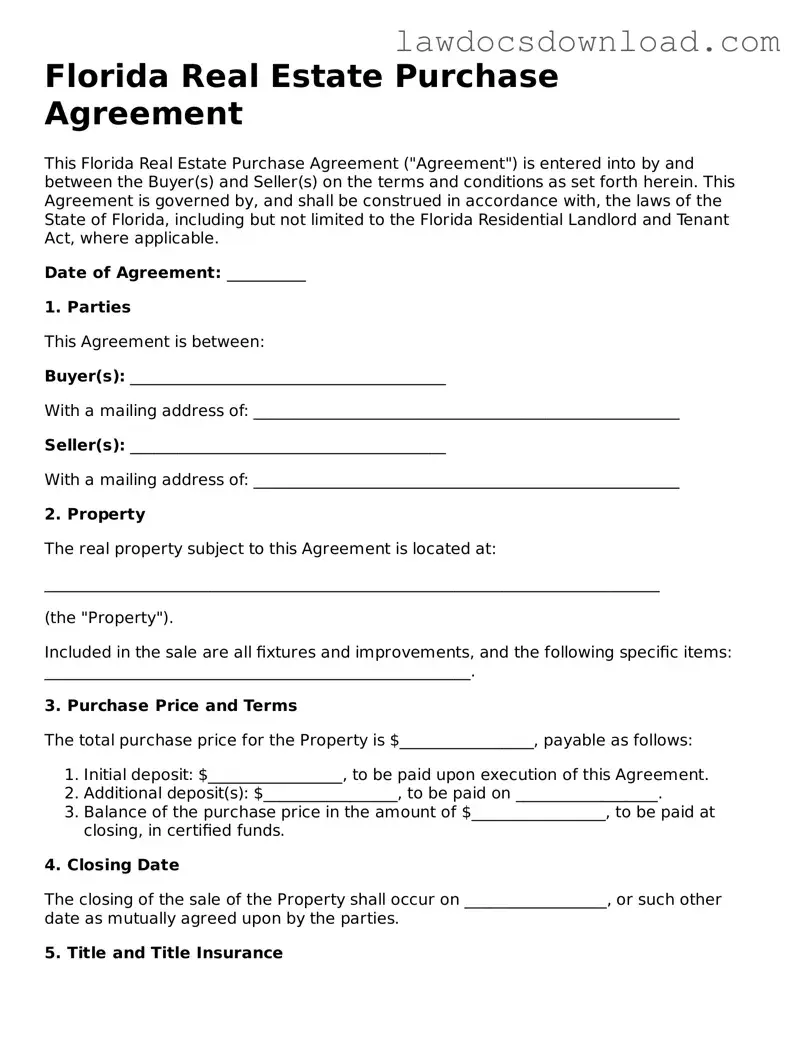Florida Real Estate Purchase Agreement
This Florida Real Estate Purchase Agreement ("Agreement") is entered into by and between the Buyer(s) and Seller(s) on the terms and conditions as set forth herein. This Agreement is governed by, and shall be construed in accordance with, the laws of the State of Florida, including but not limited to the Florida Residential Landlord and Tenant Act, where applicable.
Date of Agreement: __________
1. Parties
This Agreement is between:
Buyer(s): ________________________________________
With a mailing address of: ______________________________________________________
Seller(s): ________________________________________
With a mailing address of: ______________________________________________________
2. Property
The real property subject to this Agreement is located at:
______________________________________________________________________________
(the "Property").
Included in the sale are all fixtures and improvements, and the following specific items: ______________________________________________________.
3. Purchase Price and Terms
The total purchase price for the Property is $_________________, payable as follows:
- Initial deposit: $_________________, to be paid upon execution of this Agreement.
- Additional deposit(s): $_________________, to be paid on __________________.
- Balance of the purchase price in the amount of $_________________, to be paid at closing, in certified funds.
4. Closing Date
The closing of the sale of the Property shall occur on __________________, or such other date as mutually agreed upon by the parties.
5. Title and Title Insurance
Seller agrees to convey a good and marketable title to Buyer by Warranty Deed, free of any liens or encumbrances except as specifically provided in this Agreement. Buyer may, at Buyer’s expense, obtain a title insurance policy from a company of Buyer’s choosing.
6. Inspection and Due Diligence
Buyer shall have the right to conduct a property inspection(s) within ______________ days after the effective date of this Agreement. If the inspection(s) reveal defects that Buyer is unwilling or unable to assume the cost of repairing, Buyer may terminate this Agreement by written notice to Seller within the inspection period, resulting in a refund of the Buyer’s deposit(s).
7. Closing Costs
The parties agree that closing costs, as applicable under Florida law, shall be allocated as follows:
- Buyer is responsible for: ______________________________________________________
- Seller is responsible for: ______________________________________________________
8. Governing Law
This Agreement shall be governed by and construed in accordance with the laws of the State of Florida.
9. Entire Agreement
This Agreement, including any attachments and exhibits hereto, constitutes the entire agreement between the parties and supersedes any prior understandings, agreements, or representations by or among the parties, written or oral, that may have related to the subject matter hereof in any way.
Buyer's Signature: ______________________________________ Date: _______________
Seller's Signature: ______________________________________ Date: _______________

